Unity in Dream City: Organizing for Local Justice in 2009 Compiled by Andrew Willis Garcés and Mackenzie Baris
INDEX:
*The Year in Struggler* Victories Organized by Issue Housing/Gentrification Labor/Workers’ Rights Youth/Education Public Sector & Safety Net Police Accountability *Spotlight: Tenants Advance Campaign to Improve Rental Housing Conditions *Read last year’s Continuing the Dream: Organizing for Local Justice in 2008 and Making the Dream City: Organizing for Local Justice in 2007
THE YEAR IN STRUGGLE
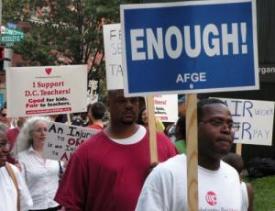 This was the year that Mayor Adrian Fenty united nearly every organized group in the city, and most councilmembers, against his authoritarian, anti-working-families agenda. His budget cuts that targeted low-income families and survivors of domestic violence, improper layoffs of public sector workers and closing of 13 childcare centers, among other actions, spawned many unlikely coalition partnerships, like Take Back DC’s union of taxi drivers, government employees, and pro-public property activists (see below). Positive Places and DC Fights Back continued to press Fenty to house all 440 people on the wait-list for subsidized housing for people with AIDS. Former residents of Franklin Shelter sued the mayor over the shelter’s 2008 closing; the suit was filed a few months before his administration cut $30 million from the city’s homeless services budget. Renters and allies successfully pushed back an attempt by Fenty to eliminate the Rental Housing Commission, which hears appeals on rent control decisions.
This was the year that Mayor Adrian Fenty united nearly every organized group in the city, and most councilmembers, against his authoritarian, anti-working-families agenda. His budget cuts that targeted low-income families and survivors of domestic violence, improper layoffs of public sector workers and closing of 13 childcare centers, among other actions, spawned many unlikely coalition partnerships, like Take Back DC’s union of taxi drivers, government employees, and pro-public property activists (see below). Positive Places and DC Fights Back continued to press Fenty to house all 440 people on the wait-list for subsidized housing for people with AIDS. Former residents of Franklin Shelter sued the mayor over the shelter’s 2008 closing; the suit was filed a few months before his administration cut $30 million from the city’s homeless services budget. Renters and allies successfully pushed back an attempt by Fenty to eliminate the Rental Housing Commission, which hears appeals on rent control decisions. 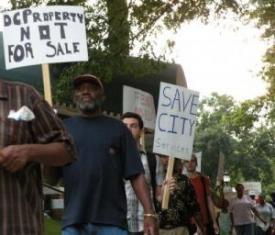 And although many parents, municipal workers and even cab drivers rallied to save childcare centers from being closed, ultimately the mayor ignored all appeals for justice, including emergency Council legislation seeking to stall the closure. As the curtain fell on the year, Fenty allowed his chief of police, Cathy Lanier, to overturn a decades-long policy barring the MPD from collaborating with federal immigration authorities. As this report goes to press, organizers and advocates are scrambling to prevent the policy, which would require the MPD to check the immigration status of almost everyone taken into custody, from going into effect. You can read one activist’s take on Fenty’s unity-building among social justice groups, as seen through the struggle for queer liberation, at The Bilerico Project.
And although many parents, municipal workers and even cab drivers rallied to save childcare centers from being closed, ultimately the mayor ignored all appeals for justice, including emergency Council legislation seeking to stall the closure. As the curtain fell on the year, Fenty allowed his chief of police, Cathy Lanier, to overturn a decades-long policy barring the MPD from collaborating with federal immigration authorities. As this report goes to press, organizers and advocates are scrambling to prevent the policy, which would require the MPD to check the immigration status of almost everyone taken into custody, from going into effect. You can read one activist’s take on Fenty’s unity-building among social justice groups, as seen through the struggle for queer liberation, at The Bilerico Project.
We should note that 2009 was also the closest DC residents have come to having a vote in Congress in decades. After years of lobbying, the DC Voting Rights Act, which would provisionally give DC a vote in the House of Representatives, passed the full Senate in February but was blocked in the House by a rider attached to the bill by Sen. John Ensign (R-NV) that would have eviscerated DC’s gun laws. In the wake of this loss leading advocacy group DC Vote decided to expand its overall campaign demand from single-member Congressional representation to full statehood for the District. Here’s to hoping 2010 will inspire all of us to make use of temporary setbacks to set our sights on bigger targets!
Also worth noting, although deviating from the local focus of this report, are the mobilizations of dozens of immigrant activists and their allies to defend democracy and human rights in their home countries. These are only three examples, surely not capturing the diversity of multinational organizing by DC’s immigrant populations. Early in the year Salvadoran activists helped elect the first pro-working families president of El Salvador in a generation, Mauricio Funes, with many local Salvadorans and their allies participating as election monitors, and successfully pressured the US government to remain neutral in the election. Later, Colombians and allies participated in a series of actions to pressure President Obama and congressional targets to support human rights defenders and pro-people policies. And in June and continuing through November local Hondurans and their supporters rallied to oppose a military coup and put pressure on coup government allies in the US.
Housing/Gentrification
Inclusionary Zoning Goes Into Effect In August, Mayor Adrian Fenty finally announced that DC had officially implemented the Inclusionary Zoning, which requires that private sector development companies make at least 8 percent of the units in their projects affordable to moderate income people. The Fenty administration had been dragging its feet on the program, which was adopted by the DC Zoning Commission in 2005. It took persistent pressure from advocates and activists with the Coalition for Smarter Growth and Affordable Housing Alliance, exposure in the Washington City Paper, and legislation by the DC Council mandating implementation to force the Mayor’s hand. After the District published a rent and price schedule in the DC Register – the final step in establishing the program – developers of new residential projects with 10 or more units are allowed to increase the size of their project by 20 percent provided half of the additional new units created are either sold or rented to residents earning between 50 percent and 80 percent of the Area’s Median Income, which is between $51,000 and $82,000 for a family of four. The final steps will be for the District to devise a lottery system to ensure there is a fair and transparent process for potential buyers and renters to secure affordable units as they become available.
Tenants Win Proactive Inspections In May tenants won their demand that the Department of Consumer and Regulatory Affairs (DCRA) implement proactive inspections in residential buildings, with the department beginning a Proactive Inspections Pilot Program modeled after a demand first made in July 2008 at the first citywide Tenant Town Hall, and which tenants continued to press over the course of the next year. (see below for more on this campaign)
Tenants Show Talent to Buy Their Building  The tenant association of 1111 Columbia Rd NW held a Tenant Talent show in February to raise money towards the purchase of their building as a coop. The Kids Tenant Association of 1111 Columbia Rd performed a puppet show at the event about community coming together to preserve their neighborhood. The show brought together over 100 people and raised over $1,000 towards putting control of the building in the tenant’s hands.
The tenant association of 1111 Columbia Rd NW held a Tenant Talent show in February to raise money towards the purchase of their building as a coop. The Kids Tenant Association of 1111 Columbia Rd performed a puppet show at the event about community coming together to preserve their neighborhood. The show brought together over 100 people and raised over $1,000 towards putting control of the building in the tenant’s hands.
SisterSpace & Books Reopens Community institution SisterSpace & Books re-opened its doors in Petworth in November, five years after being evicted from its longtime home on U Street. The opening was supported by many in African-American faith and social justice communities, and the store continues to be staffed by volunteers. Founder Faye Williams has plans to expand the space to provide tutoring, literacy and GED classes, book clubs, cultural events and workshops.
Labor/Workers’ Rights
Union de Trabajadores Wins Wage-Hour Office Reforms  Members of the Union de Trabajadores de Washington, DC, DC’s only day laborer association, kicked off 2009 by launching an ambitious campaign to fight Wage Theft in DC. The workers aimed both to directly recover money stolen by employers and to reform the DC Office of Wage-Hour, which is supposed to work to investigate cases and reclaim stolen wages. Workers began by analyzing the problem- both how wage theft happens and how the office operates. In March, members of the Union de Trabajadores publically issued a comprehensive set of recommendations for reforming the wage and hour office during Department of Employment Services oversight hearings at the City Council. Their testify, backed up by collecting hundreds of letters and postcards from allies and staging actions on the Mayor’s office and DOES, won them a meeting with new DOES Director Joe Walsh in May. In the packed basement of Foundry United Methodist Church, Walsh publicly agreed to a long list of the workers’ demands. Walsh’s committments, when implemented, will better protect contingent workers by removing barriers to accessing Wage-Hour services, improving investigations, improving communication with workers that have filed cases, punishing unscrupulous employers, and working more closely with the Attorney General when necessary to pursue fines for employers.
Members of the Union de Trabajadores de Washington, DC, DC’s only day laborer association, kicked off 2009 by launching an ambitious campaign to fight Wage Theft in DC. The workers aimed both to directly recover money stolen by employers and to reform the DC Office of Wage-Hour, which is supposed to work to investigate cases and reclaim stolen wages. Workers began by analyzing the problem- both how wage theft happens and how the office operates. In March, members of the Union de Trabajadores publically issued a comprehensive set of recommendations for reforming the wage and hour office during Department of Employment Services oversight hearings at the City Council. Their testify, backed up by collecting hundreds of letters and postcards from allies and staging actions on the Mayor’s office and DOES, won them a meeting with new DOES Director Joe Walsh in May. In the packed basement of Foundry United Methodist Church, Walsh publicly agreed to a long list of the workers’ demands. Walsh’s committments, when implemented, will better protect contingent workers by removing barriers to accessing Wage-Hour services, improving investigations, improving communication with workers that have filed cases, punishing unscrupulous employers, and working more closely with the Attorney General when necessary to pursue fines for employers.
Day Laborers Recover $10,000 in Stolen Wages Day laborers in DC scored another big victory in October, recovering over $10,000 in stolen wages for eight workers. Members of the Union de Trabajadores de Washington, DC, a day laborer association, had been doing work on a DC public school building over the summer, and were paid less than promised. They reached out to DC Jobs with Justice and the DC Employment Justice Center, who quickly realized this public project entitled the workers to higher, “prevailing wages” for their work. After bringing together other workers from the project and strategizing with several building trades unions, DC JwJ and the DC EJC went to the Office of Public Education Facilities Modernization to discuss this violation of DC’s contracting laws. The Office collaborated in forcing the contractors to pay back wages, including proper overtime rates. The workers involved received between $300 and $3,000 each, as well as an apology from the compliance office at OPEFM. This victory not only secures justice for the workers involved, but sends an important message to contractors who believe they can hire day laborers and pay them lower rates.
Youth/Education
DC Youth Power Network Launches Rec Centers Campaign 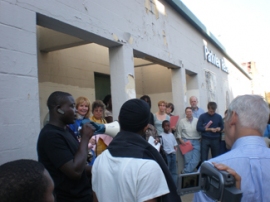 2009 was the inaugural year for DC Youth Power Network, which kicked off in June with community leadership meetings with youth leaders, youth workers, advocates, teachers and others, and house meetings with young people. YPN supporters later soaked up inspiration with a trip to visit with Baltimore’s Baltimoreans United in Leadership Development, and later in the year the group was embraced as an affiliate of the Washington Interfaith Network. YPN’s initial focus is a campaign to win funding to repair three Ward 1 recreation centers and improve job opportunities for youth.
2009 was the inaugural year for DC Youth Power Network, which kicked off in June with community leadership meetings with youth leaders, youth workers, advocates, teachers and others, and house meetings with young people. YPN supporters later soaked up inspiration with a trip to visit with Baltimore’s Baltimoreans United in Leadership Development, and later in the year the group was embraced as an affiliate of the Washington Interfaith Network. YPN’s initial focus is a campaign to win funding to repair three Ward 1 recreation centers and improve job opportunities for youth.
DCPS Students Fight Improper Teacher Layoffs After hiring a record 900 new teachers in summer 2009, just after the school year began Chancellor Rhee announced a budget shortfall and layoffs of 388 teachers and schools staff. Many accused the chancellor of using the layoffs as an illegal maneuver to fire older, more experienced teachers, with the Washington Teachers Union reporting that the average age of new teachers was 32, while the average age of those laid off was 48. Students at Duke Ellington School for the Arts and other schools led protests, with over 200 walking out to hold a rally at the school system headquarters. Police arrested one student after several hundred gathered at McKinley Tech to protest the layoffs. Although most of the layoffs did go into effect, the students’ on-point organizing inspired many adults to get involved in large rallies at the Wilson Building and other actions.
Guidance Counselor Campaign Victory for Youth Education Alliance  After two years of organizing, in April members of the Youth Education Alliance won an increase in funding for school guidance counselors in the 2010 DCPS budget. The campaign was kicked off by Anacostia Senior High School students, who in 2006 had one guidance counselor for every 900 students, far above the 1:250 ratio recommended by the American School Counselor Association. The campaign victory advances their Student Bill of Rights that guarantees public school students adequate access to counselors.
After two years of organizing, in April members of the Youth Education Alliance won an increase in funding for school guidance counselors in the 2010 DCPS budget. The campaign was kicked off by Anacostia Senior High School students, who in 2006 had one guidance counselor for every 900 students, far above the 1:250 ratio recommended by the American School Counselor Association. The campaign victory advances their Student Bill of Rights that guarantees public school students adequate access to counselors.
SMART Wins Resources for ESL Students The DC Language Access Coalition’s student organizing program for ESL students, SMART, has gotten over 200 signatures from students supporting improved language access, after-school programs, and materials for ESL students. They presented these petitions to principals reminding them to consider ESL students as they make their budgets for the year. The students have also come up with some solutions to the issues, and have scheduled a meeting with Michelle Rhee to discuss their needs. They met with Rhee early in 2009, and the meeting resulted in Rhee doing a walk-through of Coolidge and Cardozo High Schools to see for herself what the students had attested to. The Office of Bilingual Education then sent bilingual dictionaries and hired new ESL teachers to reinforce ESL programs.
Public Sector & Safety Net
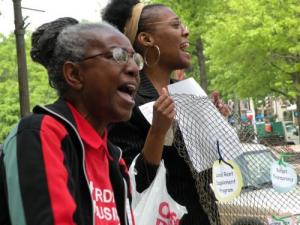 Advocates Defeat Proposed Safety Net Budget Cuts In the spring Mayor Fenty proposed $102 million in budget cuts, over half of which would impact services for low-income residents. The single largest proposed cut was an almost $10 million reduction to spending on the Temporary Assistance for Needy Families (TANF) program, which provides cash assistance and job readiness services to low-income families with children. Changes to TANF would have allowed the administration to use a full family sanction policy – completely cutting off families who, possibly through no fault of their own, are not in compliance with TANF requirements. Advocates from the Fair Budget Coalition mobilized, and a small group launched Save Our Safety Net, an online campaign to generate support for the programs targeted by budget cuts. In the space of one week, thousands signed the online petition, and over two hundred turned out for a City Council rally and lobby day. Their efforts proved successful, as the council reversed the harmful TANF sanction policy and restored funding for civil legal services, job training, and housing and grandparent caregivers supports for children in the child welfare system. Watch a video and read a report to learn more about what TANF recipients think about how the program can be strengthened.
Advocates Defeat Proposed Safety Net Budget Cuts In the spring Mayor Fenty proposed $102 million in budget cuts, over half of which would impact services for low-income residents. The single largest proposed cut was an almost $10 million reduction to spending on the Temporary Assistance for Needy Families (TANF) program, which provides cash assistance and job readiness services to low-income families with children. Changes to TANF would have allowed the administration to use a full family sanction policy – completely cutting off families who, possibly through no fault of their own, are not in compliance with TANF requirements. Advocates from the Fair Budget Coalition mobilized, and a small group launched Save Our Safety Net, an online campaign to generate support for the programs targeted by budget cuts. In the space of one week, thousands signed the online petition, and over two hundred turned out for a City Council rally and lobby day. Their efforts proved successful, as the council reversed the harmful TANF sanction policy and restored funding for civil legal services, job training, and housing and grandparent caregivers supports for children in the child welfare system. Watch a video and read a report to learn more about what TANF recipients think about how the program can be strengthened.
Metrobus Riders Defeat Proposed Service Cuts In April Metrobus riders defeated a Metro Board plan to eliminate, reroute or reduce service on 70 bus routes. Over 2,700 people sent in comments against the proposal, 400 riders testified at public hearings and dozens more marched in picket lines outside Metro headquarters. This mobilization forced Metro to scrap plans for over $11 million in Metrobus cuts, with the authority opting to dip into its reserve fund instead. The fight was led by the Transit First Coalition (composed of Action Committee for Transit, Amalgamated Transit Union Local 689, Audubon Naturalist Society, Clean Water Action, Coalition for Smarter Growth, Greater Greater Washington, UFCW Local 1994, Prince George’s Advocates for Community-based Transit, Progressive Maryland, and Save Maryland Area Rail Transit).
Survivors, Advocates and Allies Rally to Save Domestic Violence Programs In September, just a few days before the start of the fiscal year, the Fenty administration announced that it would slash funding to most organizations providing counseling, housing and other services for survivors of domestic violence. At least four member organizations of the DC Coalition Against Domestic Violence lost half of their city funding. Women Empowered Against Violence(WEAVE) was particularly hard hit by the unexpected cuts, forcing the board to the brink of closing the organization. Supporters quickly organized and raised over $85,000 in 10 days to keep the group’s doors open. Similar efforts by tens of thousands of donors helped support House of Ruth and other agencies that experienced a steep loss of city funding in the same year that many foundations also reduced their funding due to the economic crisis.
Workers and Parents Unite to Block Hartsock Confirmation 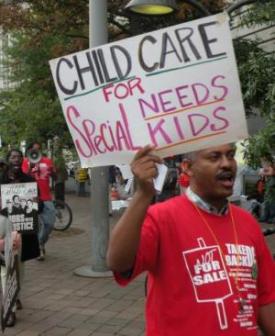 This fall, Fenty closed the doors to 13 childcare centers at DC Parks and Recreation (DPR), despite legislation requiring an impact-analysis of the closures. As a result, hundreds of children lost their care, 160 union workers are now unemployed, and the city lost high-quality, badly-needed child care services in Wards 6,7 and 8. Meanwhile, according to Ben Butler, President of AFGE Local 2741, Hartsock and the Mayor had been working to eliminate union positions by laying off workers and reconfiguring entire job categories as non-union for new hires. Under pressure from the Take Back DC campaign, led by Empower DC, the American Federation of Government Employees, and DC Jobs with Justice, the Council amended the Budget Support Act to fund daycare services and in a separate motion. The Mayor went ahead and closed the centers anyway, prompting the Council to introduced a resolution to explore the initiation of a lawsuit against the executive for failure to follow the law regarding day care program closures. Then on October 6th, the Council denied the confirmation of Interim Director Ximena Hartsock on the basis that she engaged in irregular personnel practices, caused deteriorating staff morale, and failed to comply with the law. It’s unclear whether the centers will reopen, the new Take Back DC campaign scored an initial victory by forcing the Council to block a mayoral appointment for the first time.
This fall, Fenty closed the doors to 13 childcare centers at DC Parks and Recreation (DPR), despite legislation requiring an impact-analysis of the closures. As a result, hundreds of children lost their care, 160 union workers are now unemployed, and the city lost high-quality, badly-needed child care services in Wards 6,7 and 8. Meanwhile, according to Ben Butler, President of AFGE Local 2741, Hartsock and the Mayor had been working to eliminate union positions by laying off workers and reconfiguring entire job categories as non-union for new hires. Under pressure from the Take Back DC campaign, led by Empower DC, the American Federation of Government Employees, and DC Jobs with Justice, the Council amended the Budget Support Act to fund daycare services and in a separate motion. The Mayor went ahead and closed the centers anyway, prompting the Council to introduced a resolution to explore the initiation of a lawsuit against the executive for failure to follow the law regarding day care program closures. Then on October 6th, the Council denied the confirmation of Interim Director Ximena Hartsock on the basis that she engaged in irregular personnel practices, caused deteriorating staff morale, and failed to comply with the law. It’s unclear whether the centers will reopen, the new Take Back DC campaign scored an initial victory by forcing the Council to block a mayoral appointment for the first time.
Victory in Campaign to Keep Public Space for Public Use 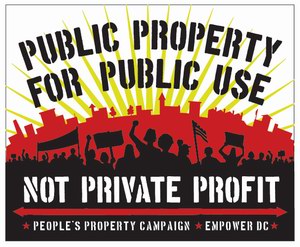 After over four years of community organizing and campaign building, Empower DC’s People’s Property Campaignsucceeded in getting the City Council to pass the Surplus Standards Amendment Act into law. The new law requires the mayor to solicit community input before declaring city-owned property “surplus.” The victory comes after years of Empower DC members conducting neighborhood outreach, testifying at public hearings, drafting legislation, lobbying councilmembers and organizing creative protests. The measure is a major roadblock to the city’s official policy of selling-off public assets like shuttered public schools, and gives community groups one more point of leverage in organizing to keep public space for public use.
After over four years of community organizing and campaign building, Empower DC’s People’s Property Campaignsucceeded in getting the City Council to pass the Surplus Standards Amendment Act into law. The new law requires the mayor to solicit community input before declaring city-owned property “surplus.” The victory comes after years of Empower DC members conducting neighborhood outreach, testifying at public hearings, drafting legislation, lobbying councilmembers and organizing creative protests. The measure is a major roadblock to the city’s official policy of selling-off public assets like shuttered public schools, and gives community groups one more point of leverage in organizing to keep public space for public use.
Police Accountability
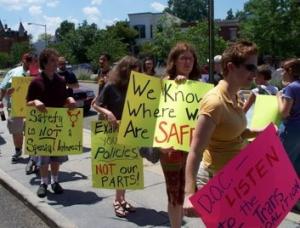 DC Trans Coalition Builds Community to Fight for Justice In 2009, the all-volunteer DC Trans Coalitioncontinued the struggle for justice for transgender, transsexual and gender-nonconforming people in DC. Focusing especially on issues affecting low-income trans communities, DCTC continued advocating for the human rights and dignity of trans/GNC prisoners locked up in DC’s jails, lobbied the City Council to restore critical public funding to services that benefit our communities, held public rallies and worked with the Office of Human Rights to enforce DC’s legal provision to guarantee our right to safe public restrooms, conducted and published a survey on trans people’s access to gender-segregated public spaces in DC, fought hard to expand mandatory training for MPD officers to reduce police harassment and brutality toward trans individuals, sent a group to New York City to march in the annual Trans Day of Action for Social and Economic Justice, testified at a City Council hearing on Hate Crimes to advocate for increased services for survivors of violence, held town hall forums with other activists to build strategy, conducted outreach at events like Pride, successfully mobilized opposition to Maryland’s proposed plan to put trans people in danger by making it harder for them to obtain ID that reflects the way they live their lives, and published and distributed resource lists and “know your rights” booklets as well as gave workshops to groups ranging from high school youth to sex worker support groups so that all of our trans/GNC communities are able to fight back when our hard-earned rights are violated. Though not all of their campaigns were victories (the Council continued drastic cuts to social services), the group’s biggest victory was bringing together a community of people ready to improve their lives, fight together to hold those with power accountable to their needs, and to provide support and solidarity to one another. For example, in response to those same budget cuts, DCTC organized fundraisers for groups affected by the budget crisis. The group looks forward to continuing to work toward a world where all people have the material resources they need to self-determine their gender identity and expression free from violence, harassment, poverty or degradation.
DC Trans Coalition Builds Community to Fight for Justice In 2009, the all-volunteer DC Trans Coalitioncontinued the struggle for justice for transgender, transsexual and gender-nonconforming people in DC. Focusing especially on issues affecting low-income trans communities, DCTC continued advocating for the human rights and dignity of trans/GNC prisoners locked up in DC’s jails, lobbied the City Council to restore critical public funding to services that benefit our communities, held public rallies and worked with the Office of Human Rights to enforce DC’s legal provision to guarantee our right to safe public restrooms, conducted and published a survey on trans people’s access to gender-segregated public spaces in DC, fought hard to expand mandatory training for MPD officers to reduce police harassment and brutality toward trans individuals, sent a group to New York City to march in the annual Trans Day of Action for Social and Economic Justice, testified at a City Council hearing on Hate Crimes to advocate for increased services for survivors of violence, held town hall forums with other activists to build strategy, conducted outreach at events like Pride, successfully mobilized opposition to Maryland’s proposed plan to put trans people in danger by making it harder for them to obtain ID that reflects the way they live their lives, and published and distributed resource lists and “know your rights” booklets as well as gave workshops to groups ranging from high school youth to sex worker support groups so that all of our trans/GNC communities are able to fight back when our hard-earned rights are violated. Though not all of their campaigns were victories (the Council continued drastic cuts to social services), the group’s biggest victory was bringing together a community of people ready to improve their lives, fight together to hold those with power accountable to their needs, and to provide support and solidarity to one another. For example, in response to those same budget cuts, DCTC organized fundraisers for groups affected by the budget crisis. The group looks forward to continuing to work toward a world where all people have the material resources they need to self-determine their gender identity and expression free from violence, harassment, poverty or degradation.
Community Fights Back Loitering Bill In March, a week of intense community pressure scored a quick victory against Ward 1 Councilmember Graham’s Hot-Spot No Loitering Bill, which would have made it easier for DC police to arrest people congregating in groups of three or more. The misguided attempt to quell youth violence would have netted day laborers waiting for work in a parking lot, residents passing the time by socializing outdoors, activists flyering outside the metro or workers protesting bad employers. Despite its unconstitutional nature, Councilmembers Bowser, Evans, Alexander, Kwame Brown and Catania had all co-sponsored the legislation. Critical Resistance kick-started the fight, which was then taken up by DC Jobs with Justice, ACLU-NAC, and many others who organized call-in days and email blasts, sent letters, and mobilized opposition to testify against the bill at city hall. Graham quickly withdrew the bill, recognizing in a letter to opponents that “the opportunity for abuse is too great.” The defeat is a testament to the power of community organizing.
Racial Profiling “Anti-Crime” Law Pushed Back by Community Mobilization In June organizers scored a hard-won victory against an “emergency” crime bill that would have authorized MPD officers to arrest anyone associating with alleged gang members. With the Fenty administration pushing hard for the expanded police powers the bill was expected to pass. But the ACLU-NCA, NAACP, Latino Economic Development Corporation and others mobilized many to oppose the measure, which appeared to setup an easy cover for racial profiling and other forms of discrimination. As reported in the Washington Post, Councilmember Harry Thomas, Jr. said during a hearing on the issue, “I have three boys. If my three boys are walking down the street and they get pulled over, are they now the Thomas gang?” Also reported by the Post, Councilmember Yvette Alexander: “Maybe none of you have experienced racial profiling, but I personally know people who have experienced racial profiling, and it’s not a good thing…. We have some overly aggressive officers who make assumptions based on someone’s appearance.” With the backing of thousands of DC residents who made calls, sent emails, testified and attended forums on community safety, the profiling section of the crime bill was defeated in a 9-4 vote.
Spotlight:Tenants Advance Campaign to Improve Rental Housing Conditions by Farah Fosse, Latino Economic Development Corporation
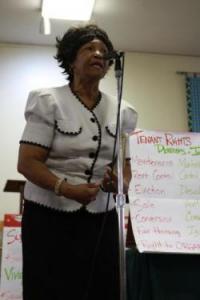 In winter of 2008 LEDC and other organizations working with tenants – including Empower DC and various legal service organizations – began meeting with tenants to determine the greatest threats to affordable housing in the District. Tenants quickly identified poor housing conditions as the problem and the city’s lack of enforcement of the housing code and inaction in holding landlords accountable as the underlying issues. Tenants then came up with proposals that were narrowed down through various community meetings to six main demands. These demands were shared with policymakers, city officials and tenants from around the city at the first Tenant Town Hall in July of 2008 which was attended by over 150 tenants from around the city. The campaign which is still building and growing has included a broad range of tenant-led initiatives, including housing reality tours for city officials and the press, tenant meetings with Councilmembers, testimony at city hearings, press events, and large tenant meetings which included mobilizing, education and organizing aspects while also focusing on building tenant organizing capacity and tenants skills as leaders.
In winter of 2008 LEDC and other organizations working with tenants – including Empower DC and various legal service organizations – began meeting with tenants to determine the greatest threats to affordable housing in the District. Tenants quickly identified poor housing conditions as the problem and the city’s lack of enforcement of the housing code and inaction in holding landlords accountable as the underlying issues. Tenants then came up with proposals that were narrowed down through various community meetings to six main demands. These demands were shared with policymakers, city officials and tenants from around the city at the first Tenant Town Hall in July of 2008 which was attended by over 150 tenants from around the city. The campaign which is still building and growing has included a broad range of tenant-led initiatives, including housing reality tours for city officials and the press, tenant meetings with Councilmembers, testimony at city hearings, press events, and large tenant meetings which included mobilizing, education and organizing aspects while also focusing on building tenant organizing capacity and tenants skills as leaders.
The campaign’s demands are:
1. Establish a system of mandatory annual inspections to complement the complaint-based system and enforce the housing code.
2. Improved procedures and regulations for inspections and enforcement.
3. Owners should prove that their building is in compliance with the housing code in order to take any rent increase available under D.C. law.
4. Strengthen tenants’ ability to hold landlords accountable for code violations. Expedite judicial procedures for tenant redress under D.C. law.
5. Use the District’s repair fund to preserve and maintain affordable housing.
6. Aggressive monitoring and oversight of the inspection, enforcement and repair proceedings by the DC Council.
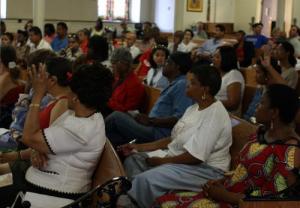 The campaign achieved its first demand in May 2009 – less than two months after the oversight hearing where tenants spoke to the city’s lack of progress on proactive inspections – when DCRA began implementing a Proactive Inspections Pilot Program modeled after the demand coming out of the July 2008 Tenant Hall Meeting! The demand for a proactive inspections regime was the Number One demand of the campaign and the demand on which tenant organizing over the last year had most closely focused.
The campaign achieved its first demand in May 2009 – less than two months after the oversight hearing where tenants spoke to the city’s lack of progress on proactive inspections – when DCRA began implementing a Proactive Inspections Pilot Program modeled after the demand coming out of the July 2008 Tenant Hall Meeting! The demand for a proactive inspections regime was the Number One demand of the campaign and the demand on which tenant organizing over the last year had most closely focused.
The pilot continued through October. During this time tenants continued testifying and working for a permanent proactive inspections program. In November 09 DCRA began implementing a proactive inspections program which includes long-term goals and included changes recommended by tenants from the pilot program. The campaign is now focused on holding city leaders accountable to continuing that program and is pushing for tenant access to enforce the housing code through legislation called the Tenant Access to Justice Reform Act which would give tenants the right to sue in Landlord-Tenant Court. The legislation had its first hearing in November of 2009 and tenants have as a goal obtaining the right to sue in the Spring of 2010.
